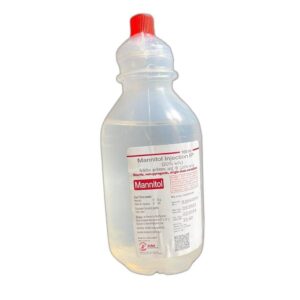MANNITOL
MANNITOL: Mannitol is a medication classified as an osmotic diuretic. It is used to increase urine output and treat conditions such as cerebral edema, acute kidney failure, and increased intraocular pressure.
The mechanism of action of mannitol involves increasing the osmolarity of the blood and filtrate in the kidneys. This osmotic effect draws water into the kidneys, increasing urine production and reducing fluid volume in the body. Additionally, mannitol helps to reduce edema by pulling water out of cells through osmosis.
Mannitol is administered intravenously, with the dose and rate of infusion depending on the specific condition being treated. For increased intracranial pressure, a single dose of 0.25-2 grams per kilogram of body weight may be given over 30-60 minutes. For renal failure, the dosage may vary from 50-200 grams per day or higher, in divided doses.
Common side effects of mannitol include headache, dizziness, nausea, vomiting, and dehydration. It may also cause electrolyte imbalances such as changes in sodium and potassium levels. In rare cases, high doses of mannitol can lead to pulmonary edema, congestive heart failure, or allergic reactions. It is important to inform the healthcare provider about any existing medical conditions or medications being taken before starting mannitol treatment.

